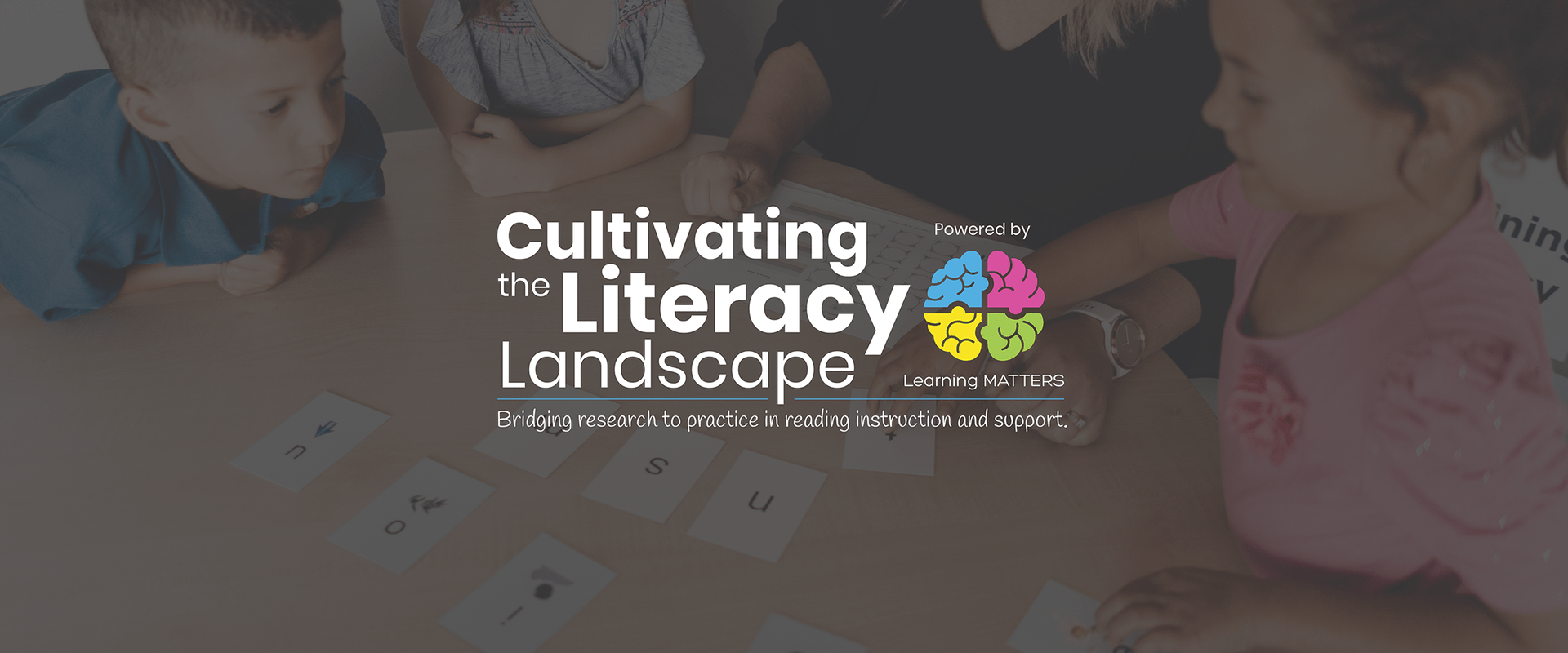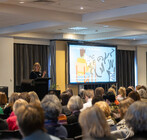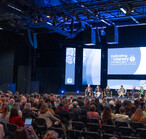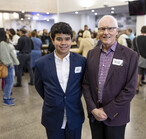Looking back at our inaugural
2023 Literacy Symposia
Whether you're new to evidence-based reading instruction or a seasoned pro, the day had something for everyone.
A day to think deeply about practice, be inspired, and hear the research.
Unlocking the Literacy Landscape
Following the two events held in August, Learning MATTERS Consultant, Ruth Blair, pulled together insights from the 2023 Cultivating the Literacy Landscape Symposia, where our trio of keynote speakers delved into the intricacies of teaching reading and revealed a wealth of knowledge and strategies for fostering strong reading skills.
Emily Hanford
Emily Hanford is a senior correspondent and producer for American Public Media. Her work has appeared on NPR and in The New York Times, Washington Monthly, The Los Angeles Times and other publications. She has won numerous honors including a duPont-Columbia University Award and the Excellence in Media Reporting on Education Research Award from the American Educational Research Association. Emily is a member of the Education Writers Association’s Journalist Advisory Board and was a longtime mentor for EWA’s “new to the beat” program. For the past several years, Emily has been reporting on early reading instruction. Her 2018 podcast episode “Hard Words: Why aren’t kids being taught to read?” won the inaugural public service award from EWA. You can find all of her reporting on reading at apmreports.org/reading, including her new podcast, Sold a Story: How teaching kids to read went so wrong (soldastory.org). Emily is based in the Washington, D.C. area.
Prof. Pamela Snow
Pamela Snow is a Professor of Cognitive Psychology and Co-Director of The Science of Language and Reading (SOLAR) Lab in the School of Education at La Trobe University, Australia. She is a registered psychologist, having qualified originally in speech-language pathology and has taught a wide range of undergraduate and postgraduate education and health professionals. Her research has been funded by nationally competitive schemes such as the ARC Discovery Program, ARC Linkage Program, and the Criminology Research Council, and concerns the role of language and literacy skills as academic and mental health protective factors in childhood and adolescence.
Pamela is a Life Member of Speech Pathology Australia and a past Victorian State Chair of the Australian Psychological Society. She has over 250 publications, comprising refereed papers, books and book chapters, monographs and research reports. In addition to these academic outputs, Pamela writes a popular blog for teachers, parents, and clinicians: The Snow Report, and is a founding Associate Editor of The Reading League Journal.
Dr Lorraine Hammond AM
Dr Lorraine Hammond AM, is an Associate Professor at Edith Cowan University who has worked and researched in the areas of early literacy, high impact instructional strategies, including explicit teaching and learning difficulties since 1990. Awarded a Churchill Fellowship in 2002, Lorraine has been recognised by an Australian Government National Teaching Award (2016) for outstanding tertiary teaching and in 2017 the Australian Council for Educational Leadership recognised her work in schools promoting high impact instruction. In 2019, Lorraine received an Order of Australia (AM) for her significant contribution to tertiary education and the community. Since 2017, Lorraine has developed and presented professional learning on evidence-based literacy strategies for the Kimberley Schools Project in the north of Western Australia in regional and remote community schools as well as the Catholic Archdiocese of Canberra/Goulburn and Tasmania.
Why
Emily Hanford
Why are we here? The current state of Literacy (globally) and how we’ve got to be where we are in 2023.
What
Prof. Pamela Snow
What the research tells us about how the brain learns to read, the Science of Reading and how we bridge research to practice.
When we know better we can do better.
How
Dr Lorraine Hammond AM
Teaching practices that are and will lead to increased student outcomes in literacy. How can we raise the literacy rates of our most vulnerable students - practical tips.
Panel discussion
Keynote speakers and panel guests
What is happening in New Zealand education to make this change and what more is necessary.
The panel discussion will bridge the incredible work happening from a grass roots level and make connections to the keynote presentations.
Jo McKay, Principal, Holy Family Catholic School Wanaka
Jo McKay is an experienced educational leader, with over 20 years of leadership experience in the primary school setting. For the past nine years, Jo has served as the Principal of Holy Family Catholic School Wanaka.
In 2018, Jo and her team embarked on implementing an evidenced-based Structured Literacy approach at Holy Family. As a passionate advocate for ensuring learning success for every learner, Jo leads bold and courageous changes in practice to achieve this goal. Her dedication to teaching and learning through leadership has been previously recognized through her receipt of the prestigious Linking Minds scholarship.
Holy Family Catholic School is a leading school in its delivery of evidence based structured literacy instruction. With its regular Structured Literacy open days, the school is committed to sharing its successes and insights with others in the field of education from throughout the country.
Sharon Scurr, Founder of Dyslexia Evidence Based (DEB)
Sharon Scurr’s journey began when her son didn’t learn to read. She went looking for answers, which led her to train and complete an accreditation through the Institute of Multisensory Language Education.
Believing in paying it forward, Sharon founded the Dyslexia NZ Evidence Based group (DEB) for parents like her who needed a safe place to learn and educate themselves. It was important to Sharon the group was a safe space for teachers, educators and parents to learn from each other.
Today, DEB is not just a place to find scientific evidence-based research and information. You will find an amazing, unique community of more than 8500 members (and growing). Every day members pay it forward, share knowledge and offer support to each other.
Felicity Fahey, Deputy Principal, Kaiapoi North School
Felicity Fahey is the Deputy Principal at Kaiapoi North School, which in 2019, began the implementation of Structured Literacy. Their journey has been shared with many teachers and RTLBs across New Zealand, plus provided PLD to many schools.
Passionate about providing best practices and support for all students, Felicity provides ongoing guidance and support, coaching teachers and leading staff professional development. As well as implementing Structured Literacy across the whole school, Felicity has been part of the team supporting staff with the implementation of The Writing Revolution at Kaiapoi North School
Felicity is committed to continuing her learning in the Science of Reading/Learning journey and how best to meet all students' learning needs. Over the last 6 months, Felicity has been part of the Ministry of Education team working on the Common Practice Model.
Auckland panel guests
Prof. James Chapman, Professor Emeritus of Educational Psychology at Massey University
James Chapman is Professor Emeritus of Educational Psychology at Massey University. He received his M.A. in Education from Victoria University of Wellington, and his Ph.D. in Educational Psychology from the University of Alberta, Canada. He joined Massey University in 1980. During his 40+ years at Massey he served for 8 ½ years as Head of the Department of Learning and Teaching, and 10 years as Pro Vice-Chancellor of the College of Education. He has published over 150 journal articles, book chapters and books on learning disabilities, literacy learning difficulties, early literacy development, and motivational factors in academic achievement. In 1999 he was co-winner of the International Reading Association’s Dina Feitelson Award for Excellence in Research. Professor Chapman is a Science Advisor for the Better Start Literacy research at the University of Canterbury, and was on the Ministry of Education Common Practice Model Contributors’ Group.
Joann Bevens, Across School Teacher Kāhui Ako Whangaparaoa Peninsula
Joann is a skilled practitioner of Structured Literacy. She has successfully taught hundreds of students with diverse learning profiles over sixteen years of classroom practice. Joann holds a master’s degree in Special Education and is certificated as a Structured Language Classroom Teacher through the Center for Effective Reading Instruction (CERI).
As a person with dyslexia, and a mother of a neurodiverse child, Joann is passionate about equitable access for all learners. She currently leads Structured Literacy initiatives for the Whangaparaoa Peninsula Kāhui Ako and teaches a Year 3/4 class.
Theresa Kinloch, Senior Teacher Year 0/1, Willow Park School
Theresa Kinloch is a Structured Literacy coach and Team Leader at Willow Park School, and an Across School Lead for Northcote Kahui Ako.
Theresa is a dedicated educator that is committed to making a difference. Her passion for the science of reading was strengthened following Willow Park School’s involvement in piloting BSLA.
As a result, Theresa led the implementation of Structured Literacy in the Junior school, with the practice now embedded across the school from Years 0 to 6.
Theresa says the structured literacy approach has guided their practice and commitment to support students develop the literacy skills they need to succeed in school and beyond. As an outcome, their school results have accelerated.

















































